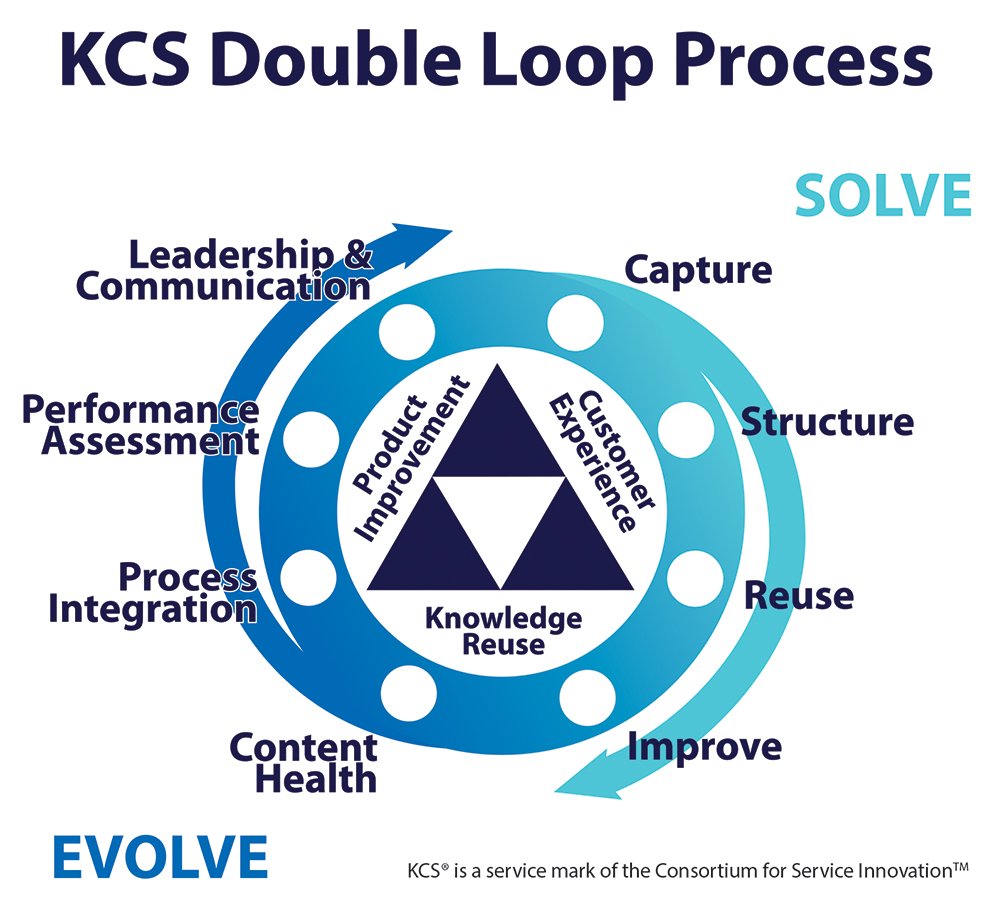In the ever-evolving landscape of knowledge management, organizations seek innovative ways to empower their workforce, enhance customer experiences, and achieve better outcomes. Knowledge-Centered Service (KCS) is a methodology that not only addresses these challenges but propels organizations towards greater success. In this blog post, we will delve into the key principles of KCS, explore its benefits, and provide insights on its practical implementation.
Understanding the Core Principles of KCS
KCS revolves around four fundamental principles that lay the foundation for a robust knowledge management strategy. Let’s explore each one in detail:
- Trust: Trust is the cornerstone of KCS. It’s the belief that individuals, armed with the right information and a clear understanding of the organization’s purpose and brand promise, will make the right decisions. KCS empowers and motivates knowledge workers who create and maintain the knowledge base.
- Create Value: Knowledge is the ultimate product of knowledge workers. Each task should be approached with the overarching goal of creating value collectively. In KCS, value is derived from continually improving and enhancing articles as they are reused.
- Demand-Driven: KCS operates on a “Just-In-Time” principle, focusing on immediate action rather than preemptive preparations. The methodology acknowledges the difficulty in predicting the future value of an interaction and instead prioritizes capturing knowledge based on real-time demand.
- Abundance: Knowledge is an abundant resource; it grows with each interaction or experience. No one leaves an interaction with less knowledge than they had before. The more we share, the more we learn, promoting a culture of continuous learning and improvement.
Defining Knowledge in KCS
Knowledge in the KCS framework is not just information; it’s information upon which we can act. It is a product of interaction and experience. It’s important to recognize that our knowledge is never 100% accurate or complete. It is validated through usage, and its value is immeasurable as we rely on it daily.
KCS: Managing the Risks of Knowledge
KCS effectively manages the inherent risks associated with knowledge. It capitalizes on collective experiences and interactions while minimizing hesitation to share information. Since knowledge is constantly evolving and validated through use, KCS embraces the concept that knowledge is never static.
This methodology encourages capturing, structuring, reusing, and improving knowledge as part of the organizational culture. The more knowledge we accumulate, the higher the quality of our collective knowledge base becomes.
The Double Loop Process in KCS
The processes of KCS revolve around a double loop process. It’s called “double loop” because the “Solve” and “Evolve” processes continually reinforce each other. This approach optimizes the health of the knowledge base and enhances the organization’s capabilities.

The Consortium for Service Innovation
KCS is not just a concept; it’s supported by a consortium dedicated to promoting its principles and best practices. The Consortium for Service Innovation is a non-profit alliance of service organizations that actively develop, nurture, and evangelize KCS. This consortium conducts research and development, gathers cross-industry perspectives, and creates innovative business strategies and models.
Success Stories of KCS
KCS has proven to be a game-changer for organizations. Let’s explore a success story to illustrate its effectiveness:
Imagine a customer had a problem that was solved in minutes, not hours. The knowledge worker answered a question they didn’t know the answer to themselves, but the organization did. This was made possible by KCS, which focuses on knowledge as the key asset of the organization. The benefits of KCS extend to the organization, the customer, and the knowledge worker.
Benefits of KCS for Various Stakeholders
KCS brings significant advantages to multiple stakeholders within an organization:
- For the organization: Improved resolution at first contact, enhanced visibility into organizational knowledge, quicker mastery of skills, and valuable feedback to improve products and documentation.
- For the customer: Empowerment to find answers through self-service, faster time to resolution, and consistent, accurate responses from the organization.
- For the knowledge worker: Engaging in more interesting work, providing faster resolution for known issues, accessing a broad knowledge base at any time, and gaining recognition for sharing and collaborating.
The KCS Article: A Closer Look
In KCS, knowledge is encapsulated in what is known as a “KCS article.” An article contains several key components:
- Issue: The specific problem or question presented by the requester.
- Environment: The context in which the issue occurs, including the product or service and the surrounding conditions.
- Cause: The underlying reason behind the issue.
- Resolution: The steps required to address the requester’s problem.
- Title: A concise statement that reflects the issue and environment, facilitating easy searching.
Structuring Knowledge in KCS
Effective knowledge management involves structuring knowledge in a way that enhances its accessibility and usability. Here are some key considerations:
- Separate the issue from the environment to improve search results based on problem symptoms.
- Write complete thoughts, not complete sentences, to improve article readability, especially for non-native speakers.
- Retain the words and phrases used by the requester to describe their issue, increasing findability for others.
- Aim for an article that is “sufficient to solve” the problem; it doesn’t have to be perfect.
Components of Content Health in KCS
KCS emphasizes the continuous improvement of knowledge articles. Several components contribute to the quality of these articles:
- Article Confidence: Articles go through various confidence levels, from work in progress to validated. Confidence increases as articles evolve and prove their quality.
- Article Audience: Defines who can access the article – internal for employees or external for customers.
- Article Governance: Dictates who can modify or create articles, based on whether they are experience-based or compliance-based.
Roles in the KCS Licensing Model
KCS assigns different roles to knowledge workers based on their proficiency and responsibilities:
- KCS Candidate: Basic users who create articles in a work-in-progress or not-validated state.
- KCS Contributor: Knowledge workers who create, modify, and validate articles, improving them when necessary.
- KCS Publisher: Authorized to set articles to external visibility and modify externally-facing content.
- Coaches: Experts who assist others in developing their KCS proficiency and act as part-time mentors.
- Knowledge Domain Expert (KDE): Focused on creating Evolve Loop content based on Solve Loop articles, maintaining the knowledge base, and specializing in specific knowledge areas.
Content Standard Checklist
The Content Standard Checklist is a crucial feedback tool in KCS, used by coaches to ensure knowledge workers adhere to content and structure standards. It measures criteria like article uniqueness, completeness, clarity, and metadata.
Process Integration in KCS
KCS encourages integrating knowledge capture and reuse into daily workflows. This approach ensures that valuable context is captured, saves time, and promotes a culture of continuous learning.
Structured Problem Solving Approach: KCS advocates a structured problem-solving approach to answer questions. This approach involves searching early and often, capturing the requester’s context, and creating articles in real-time.
Performance Assessment in KCS
KCS uses a balanced scorecard approach to assess individual and team performance. The goal is to link individual goals to organizational goals and measure performance based on leading indicators and outcomes. This approach allows organizations to evaluate the value created by knowledge workers in terms of the KCS principles.
Challenges in Implementing KCS
While KCS offers numerous benefits, implementing it effectively can be challenging. Here are some common challenges organizations might face:
- Change Management: Shifting to a KCS mindset can be a significant cultural shift for organizations and their knowledge workers.
- Scalability: Organizations need to ensure that KCS can scale effectively as they grow.
- Quality Control: Ensuring that KCS articles meet the required quality standards can be a continuous challenge.
- Engagement and Motivation: Knowledge workers need to be motivated to actively participate in the KCS process.
Final Thoughts
Knowledge-Centered Service (KCS) is a powerful approach to knowledge management that drives efficiency, customer satisfaction, and organizational success. By adhering to its principles and embracing continuous learning and improvement, organizations can create a culture that leverages the power of shared knowledge to achieve better results. While KCS implementation may come with its challenges, the rewards in terms of improved problem-solving, customer service, and organizational growth make it a worthwhile investment for any forward-thinking business.





